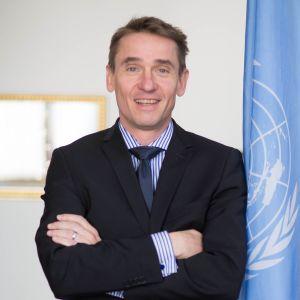Good morning Everybody,
If I have a single message to convey today it is the United Nations firmly believes that the truthful exploration of the past is of direct relevance to today’s efforts to build democracy.
The United Nations is an organization of peace that was built on the horrors of war and armed conflict. After the wars, the UN immediately begun discussing the Universal Declaration of Human Rights, recognizing the inextricable connection between respect for human rights and sustainable peace.
At the same time as adopting the Declaration, the UN also began discussing a binding treaty around human rights protection.
The building of institutions that defend human rights and constrain the powers of governments it is not an easy business.
The Universal Declaration of Human Rights was signed in 1948, and it was not until 1954 that the first draft of the International Covenant on Civil and Political Rights (ICCPR) was presented to the General Assembly and 12 more years (1966) for the text to be agreed and another 10 more years before the international covenant came into force.
The ICCPR is of relevance to your conference today. It includes the right to free movement, to leave and to return to your state. It includes the right freedom of political belief, the right to a fair trial, the prevention of torture. These are all rights that were denied unacceptably under the Hoxha regime.
And it is revealing that Albania acceded to the ICCPR only in 1991.
Today’s global framework for development, Agenda 2030, the Sustainable Development Goals also recognize this link between peace, democracy and human rights.
SDG 16 is about peace, accountable institutions and justice.
What should Albania need to do to achieve SDG 16? It needs to build an efficient and independent judicial system, something that is being undertaken now to an extraordinary degree.
But to achieve SDG 16, Albania’s institutions also need to be accountable, and this includes to be accountable for the crimes committed under the Hoxha regime.
In 2016, the independent working group under the UN Human Rights Council on enforced disappearances visited Albania. Frankly they were astounded to have found that more was not being done to find and bring to closure the estimated 6,000 missing persons. They noted that not a single prosecution was undertaken for these cases of disappearances. And they called for a broad, inclusive process of truth exploration in Albania (and here I want to underscore and endorse everything that my colleague from the OSCE has said on the importance of dealing with the past and transitional justice).
I note from the report:
“In general, the Working Group noted a continuing reluctance of Albania to address its past of serious human rights violations and the lack of a national debate around the period of the dictatorship.”
Albania’s history is of absolute relevance to today’s situation. How can you ask citizens to trust Governmental institutions if those institutions cannot even shine a light on and acknowledge their own past mistakes? To acknowledge a sign of mistake is not an act of weakness, it is an act of courage. Being accountable for the past –transitional justice - is a necessary condition to build accountable and democratic institutions in Albania.
The United Nations in many forms has encouraged this idea that exploring the past and the truth is necessary for reconciliation. In 2005, the Human Rights Council in an effort to combat impunity created a principle called: THE INALIENABLE RIGHT TO THE TRUTH.
I want to congratulate here the Authority for Information on Former Sigurimi Files and the Government for its establishment. The Authority is doing exactly what these principles call upon which is to nudge society towards a debate to shine a light on the history of Albania. The UN has been a proud supporter of the Authority on Former Sigurimi Files since its establishment. UNDP has supported the Authority to document the crimes of communism, conduct researching on forced labor concept in internship camps during the communist regime, gather oral testimonies among survivors and organize public events.
Looking forward, as the UN, across all of the Western Balkans, we are trying to gather more resources from the United Nations Peacebuilding Fund to do work on reconciliation across the subregion and we hope to work more with the Authority here.
So, your conference is of very much importance not just for historical interest but also for today’s and I wish deep and vigorous debate.
Thank you!



